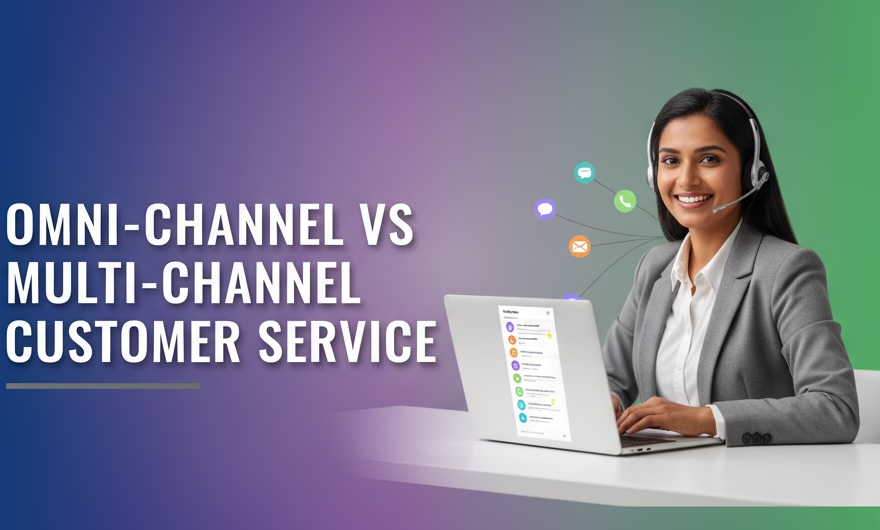Customers have access to more digital services than ever, with some providing effortless, personalized, and seamless interaction across online and offline channels. Your customers no longer compare you to just your direct competitors, but you’re benchmarked against the best digital experiences they’ve ever had.
While the traditional CX approach may have helped gain customer loyalty over the years, to retain them in the dynamic landscape, businesses must adopt smarter and more data-driven strategies.
This is where intelligent customer experience (ICX) comes into play. It’s not just a technology upgrade—it’s a fundamental reimagining of how businesses can optimize customer interactions at every step with AI, automation, and real-time data insights to drive meaningful and valuable engagement.
In this blog post, we explore the key components of ICX and how to implement them to drive customer lifetime value.
What is Intelligent Customer Experience?
Intelligent customer experience (ICX) is the transformative strategy of personalizing customer experience at every touchpoint using artificial intelligence, analytics, and automation. Unlike traditional customer experience, ICX involves leveraging these technologies to anticipate customers’ needs and proactively resolve issues.
For example, an e-commerce company uses AI and data analytics to learn from customers’ purchase history and browsing habits and predict what they might like. Using the data, the website automatically curates personalized product recommendations the next time the customer visits.
This strategy helps a business become customer-driven by making customer expectations and satisfaction central to business success.
Intelligent Customer Experience (ICX) vs Customer Experience (CX)
Surely, you are also wondering how ICX differs from customer experience (CX). In simple terms, the intelligent customer experience is an advanced variation of the customer experience approach.
Customer experience primarily relies on their feedback to understand the overall experience with the brand. The strategy uses a scoring system like CX, CSAT, and NPS to understand customers’ impressions of your brand, service, and product.
Intelligent customer experience is a strategy businesses use to improve their CX using technology. The approach uses customer insights on behavior, preference, satisfaction, and needs to personalize interactions and predict behavior at scale.
| Intelligent Customer Experience | Customer Experience |
| Uses AI, ML, automation, and data analytics to personalize & elevate customer experience | Uses feedback to understand customer needs and expectations |
| Implements predictive analytics for product recommendations & proactive engagement | Customizes experiences based on past interactions |
| Seamlessly integrates AI across digital and physical channels | Ensures consistent experience across all touchpoints |
What are the Key Components of an ICX?
There are several elements of intelligent CX working together to deliver optimal customer experience at every touchpoint.
1. Data-Driven Insights
Data plays a central role in delivering a successful, intelligent customer experience. Gathering data from different channels customers use to engage with the company allows businesses to improve their CX strategy.
These insights help the company offer services beyond personalization. You can identify what’s leading to churn, their likes and dislikes, emerging service gaps, etc. With actionable strategic intelligence, your teams will provide faster resolutions and prevent dissatisfaction.
Moreover, these findings also help companies remain customer-centric and gain a competitive edge.
2. Personalization at Scale
52% of consumers agree that their satisfaction improves as personalized digital experiences with brands become more personalized. To provide customized experiences, companies need to dive into meaningful and actionable data beyond their account ID and email address.
Using customer analytics insights, businesses can
- Suggest products based on their historical data and search pattern
- Customize promotional messages
- Communicate through customers’ preferred channel
Personalization allows brands to show appreciation and foster stronger relationships with users.
3. GenAI & Intelligent Automation
To ensure a seamless customer experience, the business must free up its resources. For example, you can automate routine tasks such as:
- Customer support with chatbots and FAQs
- Order processing, tracking, and updating
- Appointment bookings
This helps agents to focus their time and resources on high-priority tasks.
4. Seamless Omnichannel Experience
Different customers prefer different platforms for communication. Some like calling, while others like a chatbot or email. An intelligent CX allows users to choose the channel that best suits their needs. These include:
- Website
- Mobile apps
- Emails
- Chatbots
- Phone calls
- In-store interaction, etc.
An omnichannel approach provides multiple contact options and seamless integration, making it easier to continue the conversation.
5. Integrated Systems Architecture
Data and interaction across multiple channels are only valuable when your CX system is unified. An integrated system and process allow different departments to align their strategy for a comprehensive customer experience.
With seamless integration:
- Your app’s chatbot can direct an issue to a human agent
- An agent can automatically create and assign a high-priority call to the relevant team
- The chatbot can offer a discount coupon after the issue has been resolved
Exotel’s AI-powered communication platform enhances customer interactions with intelligent automation, omnichannel interactions, and personalized, data-driven experiences. Book a demo to turn every conversation into an opportunity.
Importance of Intelligent Customer Experience in Business
With intelligent CX, you can make customer service easier to reach and boost loyalty and efficiency.
Enhanced Customer Experience
It allows you to offer responsive, personalized, and efficient customer support. It also offers customized recommendations and AI-powered chatbots to simplify interaction with 24/7 support.
The strategy helps businesses drive value with easy access, quick response, and proactive services, thus enhancing customer satisfaction, brand loyalty, and profitability.
Higher Customer Retention & Lifetime Value
ICX offers a means to help businesses understand customer behavior, sentiment, and issues to gain a clear picture of customer interaction. This gives you the roadmap to focus on the right KPIs to improve engagement, retention, and lifetime value.
Competitive Advantage
Businesses that implement intelligent CX turn data into meaningful action, allowing them to provide empathetic experiences in real time.
ICX makes a business stand out from the competition by:
- Helping customers at every touchpoint
- Offering a personalized experience
- Automating customer service
- Ensuring support availability
Higher ROI
A well-defined strategy can help boost ROI by increasing efficiency, reducing operational costs, and improving customer loyalty. Companies can streamline operations and drive engagement using AI, automation, machine learning, and predictive analytics, leading to greater profitability.
ICX can help:
- Reduce operational costs with AI-powered automation and self-service solutions.
- Boost conversion and retention rates by delivering hyper-personalized customer journeys.
- Improve customer lifetime value through proactive support and issue resolution.
How to Implement Intelligence CX Seamlessly
Let’s look at the process of effectively adopting ICX in your business operations.
- Define Measurable Business Goals
Determine what you aim to achieve with the ICS strategy. Clear objectives will guide your future decisions and actions.
The objective, however, should be measurable and aligned with your overall business goals. For example, ICX can help you:
- Improve customer satisfaction and experience
- Increase work efficiency
- Boost customer retention and loyalty
- Drive ROI
- Understand Your Customers
To design a smart customer experience strategy, you must know your customers. Gather insights on how they access your website, what they look for, and what products help them achieve their goals.
The focus should be to segment customers into specific groups based on demographic, behavioral, psychographic, and customer needs. This will allow you to embrace a customer-first approach, which prioritizes products and profits.
- Invest in the Best Technology
Data is at the core of the ICX approach. Invest in tools that gather the right data. Find a platform that utilizes genAI, automation, data analytics, chatbots, virtual assistants, and other key features to improve customer experience.
Additionally, opt for data-gathering platforms such as survey platforms, contact centers, website analytics, and customer relationship management.
- Streamline Your Operational Workflow
This is a key step because it involves putting customer data and technology to use to optimize the workflow. Here’s how you can implement a seamless workflow:
- Automate routing processes like updating customer information, promotional outreach, email/SMS scheduling, etc.
- Employ AI tools like IVR, chatbots, and knowledge bases to allow customers to resolve queries independently
- Centralize customer data and automate data cleansing to remove errors and repetitive information
- Tailor experience based on individual preferences, needs, expectations, and pain points
- Implement omnichannel communication to make your business more accessible
- Personalize Customer Experience
Every brand wants to personalize its customers’ experiences. But the success of this depends on how you utilize the data and plan your approach. The best way to implement personalization is by further segmenting your customers based on usage patterns, subscription information, and engagement level.
For example, you can split your customers into new, loyal, at churn risk, land of engagement, and old customers. Based on these segments, you can tailor your approach, from promotional communication to offers and discounts.
- Train & Measure ICX Performance
Once you implement your intelligent CX strategy you need to measure and monitor its performance continuously. Define the KPIs that determine its success rate, such as:
- Customer satisfaction score and customer retention to measure loyalty and lifetime value
- Conversion rate that reflects business efficiency and profitability
- Average response and handline time to evaluate support effectiveness
Update your strategy, gather quality data, and understand customers’ evolving needs to meet their expectations. Train your employees to provide the sympathetic human touch in support interactions.
Key Takeaways
Intelligent customer experience helps a business transform customer interactions by making them proactive, personalized, and uninterrupted. With AI and automation, the company can anticipate needs, enhance responsiveness, and reduce friction, improving customer satisfaction.
Exotel’s AI-driven communication platform helps businesses make every interaction intelligent. With its real-time analytics and GenAI virtual assistance, ensure personalized and uninterrupted support 24×7. Request a demo today!
FAQs
What are the Three Pillars of Customer Experience?
The three main pillars of customer experience are customer effort, emotion, and success. Effort evaluates how easy it is for customers to interact with the brand, while emotion focuses on customer satisfaction or dissatisfaction with the experience. And success ensures customers’ needs are met.
What Are the Challenges of Implementing ICX?
Three common challenges of implementing intelligent CX is: data silos, system integration, and personalization at scale.
What is the Role of AI in Customer Experience?
AI in customer experience strategy automates support via multiple channels, personalizes interactions with sentiment and text analysis, and predicts issues to offer proactive support.It helps optimize every interaction for a seamless experience.





